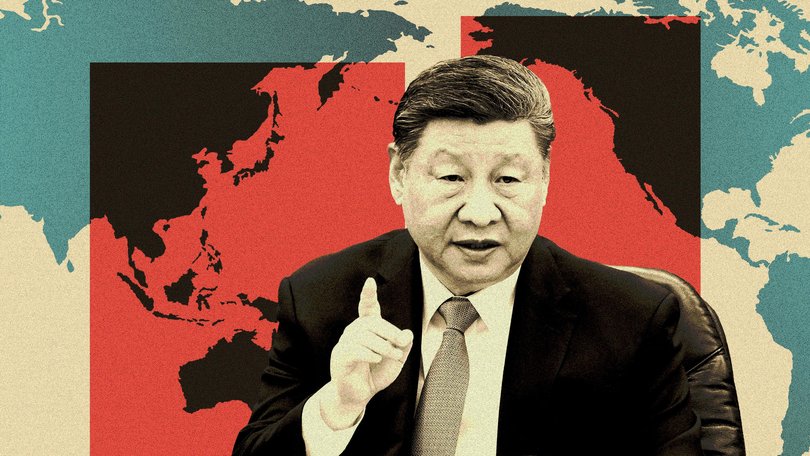NICOLA SMITH: Indo-Pacific Region has Asia focus as China denounces US strikes on Iran
NICOLA SMITH: Ripple effects of America’s involvement in the Middle East conflict are already being felt across the Indo-Pacific.

China has outwardly denounced the United States’ strikes in Iran as a “dangerous precedent” but Beijing’s strategists will be gauging the implications of tectonic shifts in the Middle East for their own future military calculations in Asia.
With the smoke clears on the potential ceasefire between Iran and Israel, it’s too soon to determine the wider geopolitical winners and losers of US intervention in the pivotal confrontation but the ripple effects are already being felt across the Indo-Pacific region.
The Ukraine-Russia war has long been viewed as a test case for a potential clash between China and the US and its allies over flashpoints like the South China Sea or Taiwan, and the Iran attacks now offer a fresh window into tactics and strategies that could influence future military decisions.
Sign up to The Nightly's newsletters.
Get the first look at the digital newspaper, curated daily stories and breaking headlines delivered to your inbox.
By continuing you agree to our Terms and Privacy Policy.On the rapidly changing international chessboard, future scenarios being gamed out in the Indo-Pacific could take several diverging paths.
Jennifer Parker, an expert associate at the ANU’s national security college, said one prevailing view was that Washington’s decision to risk striking Iran’s nuclear facilities would reestablish deterrence with China, particularly after a lacklustre approach to Ukraine in its war with Russia.
“I don’t think the key message in this bombing was necessarily directed towards China,” Ms Parker told The Nightly.
“But I think that the US would have had a view in taking this action about re-establishing deterrence against China and Russia, by demonstrating that the US is willing to take action once all reasonable steps are gone through,” she said.
A counter view, however, would consider the inconsistency around whether the US and Israel are seeking regime change in Iran as undermining that deterrence message, Ms Parker added.
As the Middle East crisis unfolds, if there is a lack of a coherent strategy by the Trump administration, this could embolden Beijing as it forges ahead with an unprecedented military build-up and advances its own territorial ambitions in Asia.
The distraction of a protracted conflict on the other side of the world could also work to China’s benefit.
“It somewhat depends how this plays out,” said Dr Alex Bristow, a senior analyst at the Australian Strategic Policy Institute (ASPI).

“If this embroils the US in a long-term conflict and requires the pulling in of assets from other regions to fight, then I think that could have a negative effect on deterrence in this region,” he said.
“But if Israel and Iran both decide to stop fighting at this point, then plausibly it could show a resolve to use military force in a targeted fashion, in a way that China would certainly take note of.”
But he also cautioned against over-amplifying direct equivalence between the weakened Iranian regime and its depleting military assets and China, a near peer competitor with US, and which now has the largest navy in the world.
“Trump could never be so confident of controlling the escalation as he could with countries like Iran,” he said.
In a meeting in Beijing this week with former UK Prime Minister Tony Blair, Chinese Foreign Minister Wang Yi echoed the view of Australia and its allies in calling for the Israel-Iran dispute to be “resolved peacefully through dialogue and consultation”.
The actions of the US and Israel sent a wrong signal to the world by favouring the use of force over negotiation and set a dangerous precedent with serious consequences, the foreign minister said, according to the Global Times.
Mr Wang’s comments on Monday came just days after Taiwan expressed concern about China’s Shandong and Liaoning carrier groups operating near the First and Second Island Chains, the strategic Pacific archipelagos off the East Asian continental mainland that are central to US and Chinese military doctrines.
A weekend statement from Taiwan’s presidential office said that President Lai Ching-te had instructed his national security team to closely monitor the situation and assess the risks, including measures to ensure stable prices and energy supplies.
“Despite present circumstances, China has not eased its military pressure in the Indo-Pacific,” it said.
Last week, the USS Nimitz carrier strike group was diverted from an Indo-Pacific deployment to support US forces in the Middle East.
With three US carrier strike groups in close proximity to the Israel-Iran conflict, Taiwan’s defence ministry reported another uptick of Chinese military aircraft near its airspace, in a fresh escalation of a long-running pattern of intimidation.
China’s Communist Party claims Taiwan as its own territory even though it has never ruled there, and has threatened to annex the democratic island of 23.5m people, which continues to operate like any other nation with its own foreign policy, currency and military.
Wen-ti Sung, an ANU Taiwan expert and non-resident fellow at the Atlantic Council, said Taiwan was concerned that the Middle East crisis could be a “potential strategic distraction,” for the US.

“A US that is becoming entrapped in Middle Eastern conflicts is one that will have less attention and resources for the Indo-Pacific,” he said.
“Taiwan is anxious that that distraction may potentially give China a greater window of opening to raise tension and create a fait accompli on the ground.”
China expert Tuvia Gering, from the Institute for National Security Studies in Israel, said Beijing was learning military and strategy lessons from the Middle East conflict, while gathering data on the performance and use of US-made weapons and Iran and Israel’s fighting methods.
He said Chinese scholars were also divided in their interpretation of evolving events, arguing it could cut both ways.
Chinese academics said US involvement in the Middle East could extend China’s strategic window but warned if the US and Israel worked together to severely weaken Iran, China’s geopolitical and geoeconomic interests could also suffer.
From his own viewpoint, Mr Gering said the US was in an dominant position in attacking Iran, one of to the strongest anti-US forces in the region.
“I think, doing so successfully, it also sends a message to China and Russia about US resolve,” he said.

